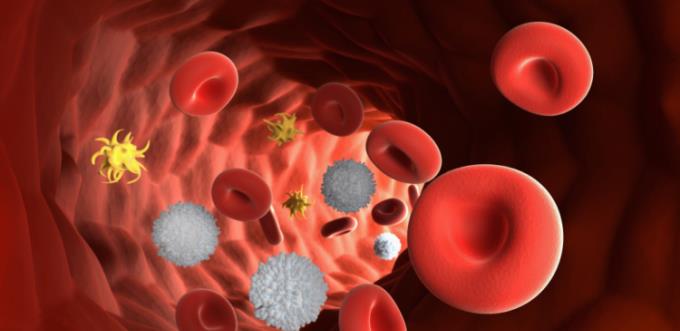Leukocytosis during pregnancy can come from many different causes and make the mother's body pregnant undergo many changes.
The period of 9 months of pregnancy makes a woman's body change a lot from physical, mental to emotional and quite dangerous if you are not aware of these differences. One of the changes that frighten many pregnant women may be related to hematology, such as leukocytes increase during pregnancy.
White blood cell (WBC) price, marketcap, chart, and fundamentals info
Cells in the immune system are white blood cells (white blood cells). They help the body fight off foreign elements and destroy any harmful threats. In addition, white blood cells also appear in most organs and organs. On the other hand, the degree of leukopenia or leukopenia becomes an indicator of whether you are healthy or not.
The role of leukocytes
While it has a common goal of boosting immune system function, the types of white blood cells produced in the bone marrow have different functions:
Neutrophils: These are the white blood cells with the highest number and are responsible for fighting bacterial or fungal infections.
Monocytes: It is responsible for withdrawing and absorbing harmful toxins of bacteria, eventually destroying them.
Eosinophils: These are the "soldiers" who shield the body against parasites and allergic reactions during pregnancy.
Basophils: Although they may be less than 1% of the total white blood cell count, they work hard to regulate blood flow and increase cells to maintain a healthy immune system. when pregnant mother is sick
Lymphocytes: This type of white blood cell produces antibodies against foreign cells and destroys them.
A change in the number of white blood cells
Both an increase or decrease in the white blood cell count will lead to changes in the body during pregnancy. This is an important factor that causes an imbalance due to the altered blood phenomenon.
The total white blood cell count increases in response to the immune system's response to an infection. It can be caused by trauma, pregnancy, allergies or an autoimmune disorder. Symptoms of leukocytosis include: fever, dizziness, allergic reactions and inflammation.
The total number of white blood cells decreases when the infection dominates the cells, weakening the immune system and weakening the body. The cause can be marrow failure, infection, sepsis. Symptoms of leukopenia are apathy, fatigue, and severe complications of infection.

Pregnant women will experience some form of leukocyte changes and are usually harmless:
1. Neutrophils
These cells usually increase during pregnancy, but they are not dangerous to the body or the fetus. The increased neutrophil count indicates that the bone marrow responds well to increased red blood cell production.
2. Monocytes
At the beginning of pregnancy, a mother's immune system undergoes changes to avoid attacking the fetus. One of the observed differences is an increase in mononucleosis. However, the side effects of this process can lead to certain complications in pregnancy such as pre-eclampsia .
To eliminate the potential danger, the doctor may advise pregnant women to have additional tests when the mononuclear leukemia index is overestimated.
3. Eosinophils
There is virtually no change in the number of these cells. Any changes will be a sign of weak immunity or an infection in the pregnant woman.
4. Eosinophils
There were no noticeable harmful changes in eosinophils during pregnancy.
5. Lymphocytes
The Lymphocyte Index will decrease in the first two trimesters and increase in the last trimester as well as postpartum. These changes come from suppression of immune activity during pregnancy.
Normal white blood cell count during pregnancy
The average number of white blood cells in non-pregnant women is between 4,500 and 11,000 / mm3. During pregnancy, the minimum quantity is maintained at 6,000 / mm3. During the third trimester, the white blood cell count typically ranges between 12,000 and 18,000 / mm³.
The risk if the white blood cell count increases during pregnancy
When the immune system self-adjusts to the little angel growing inside, it is likely that the white blood cell count increases with each different time period. However, this is not unusual and requires little emergency action.
If you experience worrying symptoms like fever, high blood pressure, acute stress or any other problem related to immunity, see your doctor immediately.
The cause of leukocytosis during pregnancy
The causes of neutropenia or proliferation in pregnant or non-pregnant women are similar. The white blood cell index is too high but for unknown reasons, it will cause many different diseases. Pregnant women should avoid a number of factors that can provoke this condition including:
1. Stress

The stress of pregnancy is not only emotional, but also physical changes. Stress causes the white blood cell index to rise higher than normal to protect the body from negative influences. Therefore, pregnant mothers should practice yoga and meditation to eliminate stress.
2. Infections
Any type of bacterial or fungal infection that causes illnesses from the common cold to urinary tract infection (UTI) causes the white blood cell count to rise during pregnancy. Pregnant mothers should be careful to keep themselves safe by increasing the necessary vitamin supplementation, cleaning the genitals cleanly. Your immune system is working harder than ever during pregnancy. So, take good care of your body.
3. Inflammation
Inflammatory diseases and related allergic reactions will also lead to an increase in the white blood cell count. In these cases, white blood cells rush to areas that need help and growth, leaving the body unresponsive. However, you can apply techniques to minimize exposure to allergens to limit the above condition.
4. Leukemia or autoimmune diseases
Autoimmune diseases such as Crohn and Graves or leukemia both increase non-functional white blood cells. Unlike in the other cases, these cells do nothing but rise to an alarming level.
A multitude of changes in the body will happen during pregnancy and even after that. Leukocytosis in pregnancy is not a concern, but any signs of immunodeficiency should be carefully observed.
You may be interested in the topic:
Hip pain during pregnancy: Causes and treatment
Pregnant women have edema: What is the cause behind?
Facial cleanser for pregnant women: Mother is beautiful and you are still healthy!













